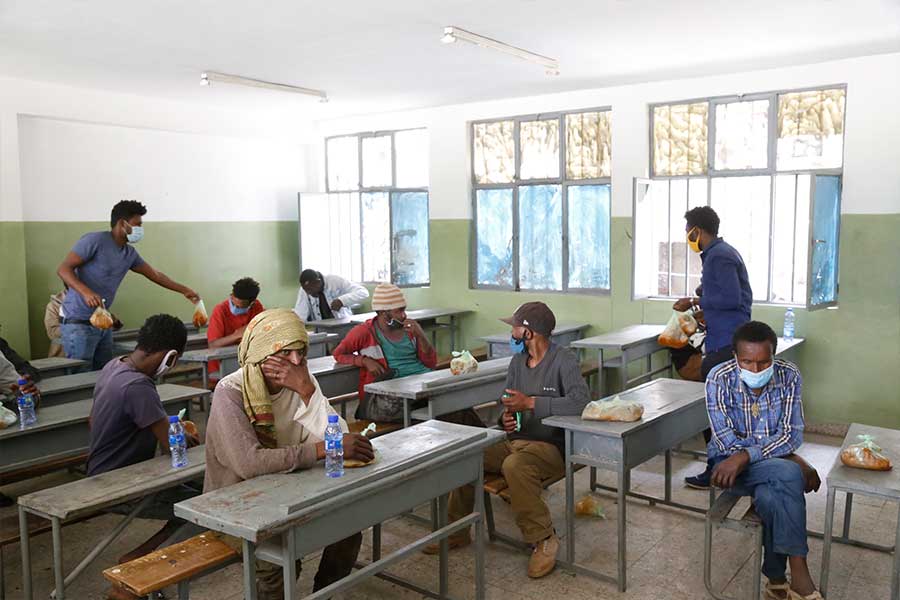
Radar | Dec 25,2021
Jul 20 , 2019
By Christian Tesfaye
Two years ago, I was a sentimentalist. I saw a nation in disarray - groups without representation, broken government machinery and large masses of youth with no sense of direction.
The answer seemed relatively straightforward - a liberal media and political landscape. The authorities should swallow their egos and allow the political space some free air. Let everyone that wants to play a part in politics have a say. Since the overwhelming majority of people are reasonable, they should easily be able to distinguish falsehoods and sensationalism for objective truths and substantive arguments.
In a genuinely liberal media and political landscape, this should help the youth let off some steam, provide a sense of representation for the various groups in society and help charter a common path forward for the Ethiopian people.
Two years later, nothing of that nature has come to fruition even as the media and political landscapes were opened. I have realised this slowly over the past few months, but nothing drove the point home as much as a forum I recently attended.
The forum was organised with the best intentions in mind, to bring people of diverging political opinions into the same room for heart-to-heart discussions about how a common path can be charted. After holding the dialogue, they would socialise, eat across the same table from one another and get to know each other on a personal level. Hopefully, they would see the error and radicalism of their ways and come to regard each other not as existential enemies but sparring partners engaged in the “great” Ethiopian project.
That was yet another assumption that did not come to pass. There was no middle ground or possible modes for cooperation that the participants could find. There was more recrimination than reconciliation, more demagoguery than reservation, more radicalism than moderation. By the time the half-day event was over, each participant was entrenched deeper into their respective nationalist and populist pits. As far as first impressions go, that forum, which was intended to be a respectable platform for substantive debate, probably did more harm than good.
What happened?
A thought experiment is due here. Imagine a grander forum, aired on live TV, that starred the likes of Jawar Mohammed, Eskinder Nega and Daniel Berhane. They would be asked questions about the fate of Addis Abeba, the current federal arrangement, the right to secession, “Oro-Mara,” economic liberalisation, the politicisation of ethnicity and a whole range of hot-button political issues. No subject matter will be taboo or off the table.
What would be the end result? Will each of the participants begin to rise above their egos and shift their worldview? Will they begin to compromise, give in a little and cease to be absolutist? Will they realise that they have all made mistakes, admit they could have framed many of their previous comments more constructively and apologise for the distress they have caused each of their political opponent’s supporters? Would they agree to call out demagoguery and even speak out when their supporters fail to uphold the spirit and letter of the constitution?
I doubt it. We are well past that point. We find ourselves at a juncture where our liberal project is crumbling to pieces. There have been plenty of forums and platforms. The media and political landscape have rarely been as open as it has been in the last year and a half. And yet there is no consensus in sight. If anything, all of us seem to be drifting away from the centre into an abyss that cannot be good for anyone but the few elites in control of the various nationalist narratives.
Not all hope is lost. I recently also attended another workshop, which I found to be significantly more rewarding. The debates were substantive and offered insights into how people with various experiences can find common ground. The platform was similar to the other one I mentioned, but the participants were quite different.
The workshop proved something. The mistake we seem to be constantly making these days is assuming that people will change and that entrenched agendas can be conceded. More often than not, they will not. The risks for activists and politicians to capitulate even a little bit are too high. We have seen what happens to the very few individuals that have dared to speak out against their own bases - they are flogged in public and flung out of political spaces. It is much more rewarding to stay entrenched.
Politics in Ethiopia is being aggravated by the fact that the platforms are given to highly partisan individuals, often in the hopes that exposure to their opponents will sober them up. We keep rewarding partisan politics by giving the spotlight to extremely partisan people. This is no way to go about it.
Ethiopia does have a shortage of intellectuals that are neutral and upstanding. But there is not the sort of scarcity that justifies constantly awarding the spotlight to people that are unlikely to come to the centre. There is no reason for this nation’s politics to revolve around these people.
Organisers and the media have the responsibility to carefully vet the people they give platforms to. The most effective means of ensuring that radical politicians and activists will not dominate the public debate is not to provide them with a platform, to begin with. The role liberal media’s coverage played in getting Donald Trump elected in the 2016 presidential election is enough of an indication for this. Populism will not be defeated if we keep giving the spotlight to populists.
“Any kind of publicity is good publicity as long as they spell your name right,” as P.T. Barnum, the famous 19th-century American showman, said.
PUBLISHED ON
Jul 20,2019 [ VOL
20 , NO
1003]


Radar | Dec 25,2021

Radar | Apr 19,2025

Commentaries | Jun 18,2022

Radar | Mar 09,2019

Commentaries | Dec 11,2020

Fortune News | Oct 23,2021

Radar | Jul 13,2024

Commentaries | May 11,2024

Viewpoints | Mar 30,2019

Fortune News | Jun 14,2020

Photo Gallery | 176017 Views | May 06,2019

Photo Gallery | 166231 Views | Apr 26,2019

Photo Gallery | 156658 Views | Oct 06,2021

My Opinion | 136867 Views | Aug 14,2021

Dec 22 , 2024 . By TIZITA SHEWAFERAW
Charged with transforming colossal state-owned enterprises into modern and competitiv...

Aug 18 , 2024 . By AKSAH ITALO
Although predictable Yonas Zerihun's job in the ride-hailing service is not immune to...

Jul 28 , 2024 . By TIZITA SHEWAFERAW
Unhabitual, perhaps too many, Samuel Gebreyohannes, 38, used to occasionally enjoy a couple of beers at breakfast. However, he recently swit...

Jul 13 , 2024 . By AKSAH ITALO
Investors who rely on tractors, trucks, and field vehicles for commuting, transporting commodities, and f...

Oct 18 , 2025
The political establishment, notably the ruling party and its top brass, has become p...

Oct 11 , 2025
Ladislas Farago, a roving Associated Press (AP) correspondent, arrived in Ethiopia in...

Oct 4 , 2025
Eyob Tekalegn (PhD) had been in the Governor's chair for only weeks when, on Septembe...

Sep 27 , 2025
Four years into an experiment with “shock therapy” in education, the national moo...

Oct 18 , 2025 . By NAHOM AYELE
In a sweeping reform that upends nearly a decade of uniform health insurance contribu...

A bill that could transform the nutritional state sits in a limbo, even as the countr...

Oct 18 , 2025 . By SURAFEL MULUGETA
A long-planned directive to curb carbon emissions from fossil-fuel-powered vehicles h...

Oct 18 , 2025 . By BEZAWIT HULUAGER
Transaction advisors working with companies that hold over a quarter of a billion Bir...